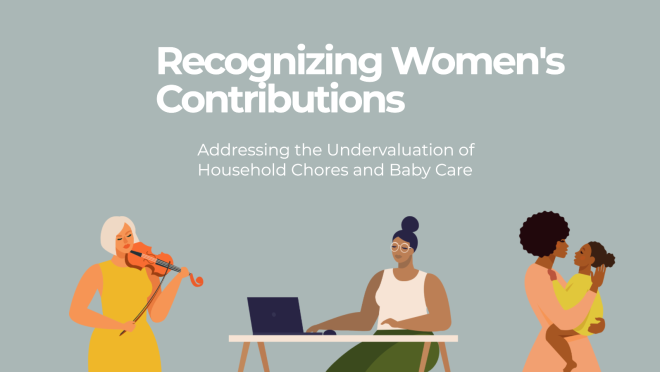Recognizing Women's Contributions
Recognizing Women's Contributions

By Md Moin Uddin Erfan
The concept of equality is widely discussed today, yet there remains a significant disparity between perception and reality when it comes to recognizing women’s contributions within the family. Household chores and baby care, despite their crucial role, are often underestimated and taken for granted. It is essential to address this issue and work towards a more inclusive and equitable society that acknowledges and appreciates the significance of these tasks.
Roots of Undervaluation
The undervaluation of women’s labor in the home and with children stems from societal conventions, gender stereotypes, and a lack of appreciation for the concept of “invisible labor.” Women’s daily lives are often consumed by these responsibilities, leaving them with limited time even during holidays and festivals. This holds true regardless of education level, whether a woman is educated or illiterate, a housewife or a working woman. Studies have shown that women in Bangladesh, for instance, spend an average of six hours per day on household tasks, while men spend just over an hour. As a result, women sacrifice their sleep, personal time, and involvement in social, political, and economic realms. The undervaluation of women’s contributions not only hampers their personal well-being but also acts as a barrier to overall societal development.
Social and Economic Disparities: South Asia, along with many other regions, faces social and economic disparities, particularly in education and health. These disparities hinder economic development by impeding the growth of human capital and the utilization of talent. In South Asia, the percentage of parents with at least one formal education stands at a mere 9%, with only 8% in Bangladesh. To foster comprehensive economic development, it is essential to reduce existing socioeconomic inequalities, generate employment opportunities, increase incomes, and expand consumers’ purchasing power.
The Unrecognized Workload: Despite the fact that women shoulder the responsibilities of cleaning the house, washing clothes and dishes, preparing meals, caring for children, and managing household accounts, their contributions are often dismissed or overlooked. When asked about the roles of their female family members, men and women themselves often respond with statements like “She does nothing” or “I don’t do anything.” Such societal notions perpetuate the idea that these tasks are solely the responsibility of women.
The Economic Impact: Data from the Workplace Gender Equality Agency (WEGA) reveals that women spend 64.4% more time working unpaid hours per week compared to men, amounting to 36.1% more time overall. This leaves them with less time for paid employment or forces them to juggle paid and unpaid work. Unpaid labor by women contributes to covering the costs of family care and economies, often compensating for the absence of social services. However, this invaluable work is rarely acknowledged as “work.” In fact, unpaid care and domestic work are estimated to account for 10% and 39% of GDP, respectively, surpassing the contributions of sectors like manufacturing, commerce, or transportation. Additionally, the effects of climate change have led to an increased burden of unpaid work on women in areas such as farming, water collection, and fuel gathering.
Impact of COVID-19: The COVID-19 pandemic further highlighted the disproportionate burden placed on women in caregiving roles. Women shouldered a greater proportion of child care duties, teaching responsibilities, meal preparation, and household cleaning. These additional responsibilities during the pandemic have likely impacted women’s capacity to engage in paid labor and other activities outside the home.
Addressing the Issue
To address the problem of unrecognized contributions by women, particularly in the domains of childcare and housework, several steps need to be taken:
Change Cultural Attitudes and Gender Roles: Cultural attitudes need to shift to foster a culture of shared responsibility within the family. Both men and women should be educated about the value of household chores and baby care, and equipped with the necessary skills to participate equitably.
Education and Awareness: Education plays a vital role in spreading awareness about the importance of domestic chores and baby care. Efforts should be made to educate society about the significant contributions women make in these areas, and to challenge stereotypes and gender biases.
Recognition and Appreciation: It is crucial to recognize and appreciate the time, effort, and skills women invest in household chores and baby care. Family members should express gratitude and acknowledge these contributions as valuable and essential to the well-being of the family.
Sharing Responsibilities: Household responsibilities should be dispersed more evenly among family members. Encouraging shared caring and reducing the burden on women can be achieved through flexible work schedules, parental leave policies, and supportive corporate cultures that prioritize work-life balance.
Economic Empowerment: Women’s financial independence can be facilitated by providing equal opportunities in education, employment, and income. By narrowing gender gaps in economic participation, women can have greater agency and decision-making power within the family.
Media Representation: Media plays a significant role in shaping societal views. Promoting diverse and realistic representations of women’s contributions to the family can challenge stereotypes and contribute to a more accurate and equitable perception of these roles.
Legislative Changes: Legislative measures should be implemented to acknowledge and respect unpaid labor. This can include policies that recognize the economic value of household chores and caregiving, such as social security benefits for caregivers and incentives for work-life balance.
Recognizing and valuing women’s contributions to the family, particularly in terms of household chores and baby care, is essential for achieving true gender equality. By challenging societal norms, promoting shared responsibilities, and implementing supportive policies, we can create a more inclusive and equitable society that appreciates and acknowledges the vital role women play in nurturing families and contributing to the overall well-being of society.


